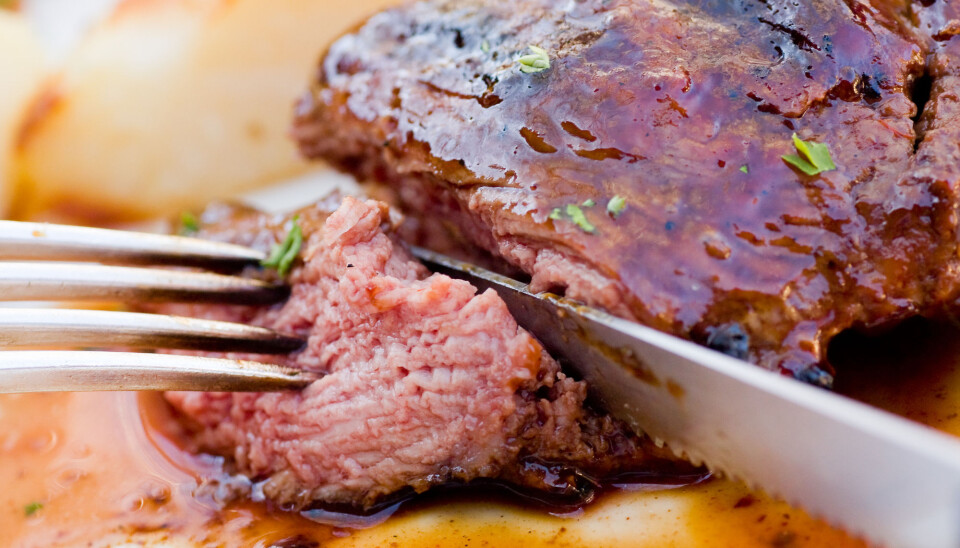
Does meat make vegetarians ill?
People sometimes say that vegetarians get sick if they begin eating meat again. Research doesn’t back them up.
Denne artikkelen er over ti år gammel og kan inneholde utdatert informasjon.
Most of us who know vegetarians have heard scary stories: A vegetarian accidentally gets a bit of pepperoni on her pizza slice or her soup contains chicken broth and she gets very ill.
Do our bodies really react so strongly to meat after avoiding it for a while? Or is this just a vegetarian myth?
We’ve put the question to scientists.
If our scientists are right, they say there’s no reason to fear a catastrophe if a vegetarian chomps into the wrong pizza. But a vegetarian who decides to start a new life as a carnivore with a huge T-bone steak might risk an upset stomach.
Don’t lose it
Few researchers have studied the consequences when vegetarians fall for temptation or simply make a mistake. However, Professor Birger Svihus of the Norwegian University of Life Sciences (UMB)’s Department of Animal and Aquaculture Sciences can make some educated guesses based on his general knowledge of the human digestive system.
“There’s no reason to believe we get sick. I can’t conceive of our bodies losing the capability to tackle meat,” he says.

“The nutrients in meats also have to be digested when we eat other foods. The enzymes that the body produces to break down meat proteins are also used to metabolize plant proteins.”
Heavy start
Professor Bjørn Skålhegg of the University of Oslo’s Department of Nutrition concurs. Nothing would indicate that the bodies of vegetarians should reject meats.
“A person might have a little problem if he or she started right out on a huge steak. Their body might not have sufficient levels of the right enzymes. Along the same lines it can be hard to digest any large meal after a long fast or period of starvation,” he says.
You might also have this problem if you start to eat other kinds of foods that you haven’t eaten in a long time.
The lonely geek who does nothing but heat up frozen pizzas day in and day out might experience some intestinal discomfort if he suddenly starts eating a lot of fruit and vegetables.
Skålhegg thinks most of us would soon get accustomed to the new additions to our diet.
Svihus points out that meat is actually relatively easy to digest.
“Proteins are generally hard to digest but compared to other sources of protein, meat is rather easy,” he says.
We might not always feel this way, but the human body is tough. It’s a very robust and adaptable machine that can tackle all kinds of challenges.
One-sided diets with large seasonal variations
“We tend to forget human history,” says Svihus. “Just 50 years ago many people [in Norway] had very unbalanced diets from day to day. And there were big variations from season to season.”
“In the late summer they had vegetables and in the autumn there was a meat surplus. But the last rutabagas stored in their cellar would be consumed by March. In March, April and May they had almost no vegetables. Fresh fruit wasn’t available after Christmas.”
Human beings are adapted to these kinds of regimes.
“The body is prepared to consume most of what it can get. Our survival has depended on being able to eat whatever was available,” says Svihus.
- RELATED: The University of Oslo has written this article on Why Norwegian soldiers didn't approve of 'Meat free Monday'
Meat allergies
This means that little in our physiology and our ancestral history should cause vegetarians to have problems if they eat a piece of meat.
“Despite that, there can be some differences between various types of vegetarians. Some have eaten eggs and milk all along, whereas vegans avoid everything from animals. I don’t believe that a vegetarian who has eaten eggs or dairy products would get sick from chicken broth,” says Skålhegg.
He says that in that case, the reaction would have to be due to a food allergy.
A very few – less than one percent of the population – are allergic to meats from common livestock, such as pork and beef. If a vegetarian has this kind of allergy, she could have a reaction from just a speck of these meats.
But an allergic in a cases like this would be more typical of a common allergic reactions, with symptoms such as congested air passages and a runny nose or eyes. Skålhegg doubts that a vegetarian who originally didn't have this kind allergy would develop one and become more sensitive to meat.
He thinks we should keep our cool and resist the onslaught of disparate warnings about nutrition and diet. After all, humans are omnivores.
“We don't need to get hysterical. If it’s food we can usually eat it.”
———————————-
Read the Norwegian version of this article on forskning.no
Translated by: Glenn Ostling


































